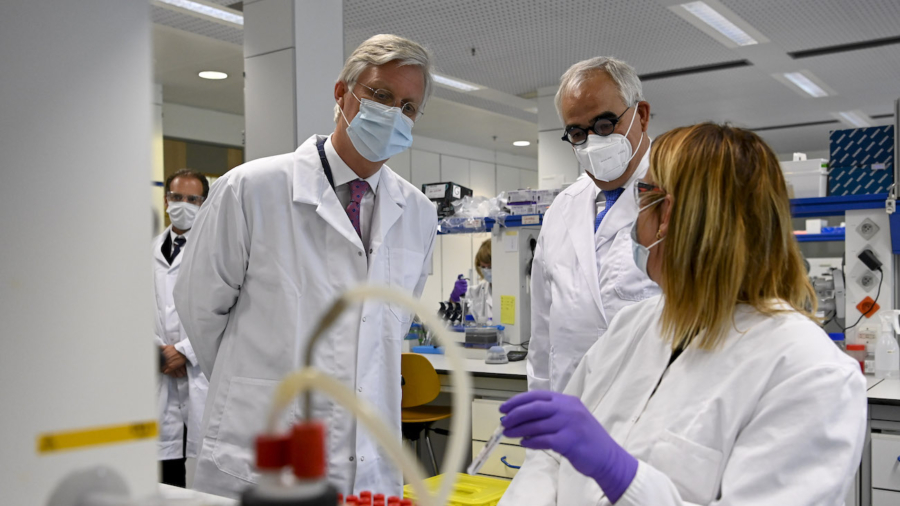U.S. company Johnson & Johnson on Wednesday announced it has reached phase 3 clinical trials for its CCP virus vaccine candidate, becoming the fourth manufacturer to reach this phase in clinical trials amid a global pandemic.
The company joins Moderna, Pfizer, and AstraZeneca to start late stage trials for a vaccine for the CCP (Chinese Communist Party) virus, a novel coronavirus from Wuhan, China. The phase 3 trial marks the final step before drug manufacturers can seek emergency use authorization to widely distribute their vaccines. There is no authorized vaccine for COVID-19 yet.
Johnson & Johnson is pursuing a single-shot vaccine in its latest trial. Its three rival manufacturers are currently testing vaccines that would require two shots, separated by several weeks.
President Donald Trump said at a press conference on Wednesday that J&J is “far ahead of schedule” because the company had initially expected to only reach phase 1 trials by September.
“We encourage Americans to enroll in the vaccine trial. It’s not only interesting; it’ll be a terrific thing for our country. We encourage everybody to enroll, as many people as we can,” Trump said.
The J&J vaccine is being developed by the company’s Janssen Pharmaceutical Companies.
Paul Stoffels, J&J’s chief scientific officer, said the company has a goal “to deliver a vaccine for emergency use authorization in early 2021.”

He told reporters at a joint news conference that J&J expects results by late 2020 or early 2021, and that if all goes well, the company plans to manufacture as many as 1 billion doses in 2021 and more after that.
He said in the conference, attended by officials from the National Institutes of Health and the Trump administration, that the single-dose version would be “very important for emergency use” and that J&J will later test a booster dose that could produce even greater immunity to the virus.
The company is set to enroll some 60,000 volunteer participants across three continents—the largest trial compared to the other three manufacturers that have reached phase 3.
The trial “will include those both with and without comorbidities associated with an increased risk for progression to severe COVID-19, and will aim to enroll participants in Argentina, Brazil, Chile, Colombia, Mexico, Peru, South Africa, and the United States,” Johnson & Johnson said in an announcement. The participants will include “significant representation from those that are over age 60.”
“Countries and clinical trial sites which have a high incidence of COVID-19 and the ability to achieve a rapid initiation will be activated,” the company announced.
Stoffels said it will take about 6 weeks to 2 months to have enough participants in the vaccine trial.
J&J’s trial would be considered a success if it proves to be 60 percent effective, with a study protocol that could have an efficacy answer after 154 people became infected with the virus.
“The benefits of a single-shot vaccine are potentially profound in terms of mass immunization campaigns and global pandemic control,” Dr. Dan Barouch, a Harvard vaccine researcher who helped design the vaccine candidate, said in a telephone interview with Reuters.
In August, J&J had signed an agreement with the British government on a global phase 3 clinical trial to study a two-dose version of its vaccine, which will run in parallel with the single-dose trial.
At a U.S. Senate committee hearing on the CCP virus pandemic on Wednesday, Dr. Anthony Fauci, director of the National Institute for Allergy and Infectious Diseases, commented on the likelihood of having an authorization for a vaccine soon.
“We feel cautiously optimistic that we will be able to have a safe and effective vaccine, although there is never a guarantee of that,” he said.
Dr. Scott Atlas, a COVID-19 adviser to the federal government, told reporters on Wednesday that an effective vaccine could be possible soon thanks to the federal government’s Operation Warp Speed—an initiative to quickly develop vaccines and therapeutics to combat the CCP virus. The operation involves officials from the departments of Health and Human Services and Defense.
“A typical vaccine takes roughly 4 years or so, and now we’re going to have a vaccine, highly likely, in far less than 1 year, but without cutting any safety corners because the president has done things concomitant to the development of the vaccine—that is, the manufacturing and the logistics,” Atlas said. “Everything is being done at the same time, and that’s never been done before.”
Reuters and The Associated Press contributed to this report.
From The Epoch Times


